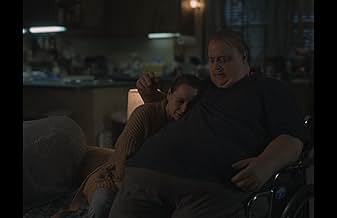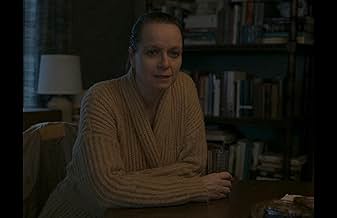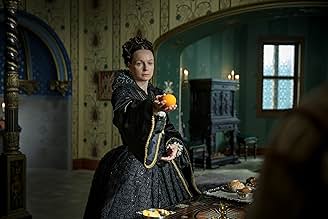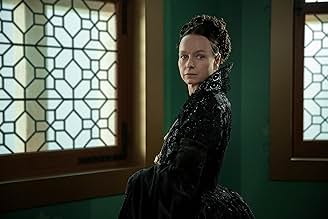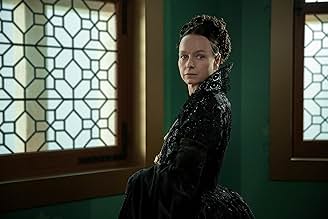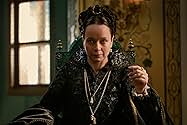Samantha Morton(I)
- Actress
- Writer
- Director
Samantha Morton has established herself as one of the finest actors of
her generation, winning Oscar nominations for her turns in
Woody Allen's Sweet and Lowdown (1999) and
Jim Sheridan's In America (2002). She has the talent to become one of
the major performers in the cinema of this young century.
Samantha Morton was born on May 13, 1977 in Nottingham, England to parents who divorced when she was three years old. Peter and Pamela Morton took other spouses and made Samantha part of a mixed family of 13; she has eight brothers and sisters. She turned to play-acting early in her life, while she was a school-girl.
At 13, she left regular school to train as an actress at the Central Junior Television Workshop, where she learned her craft for three years. It was at the end of her training then that she decided that a life as a professional actress was for her.
She honed her skills in television roles, working her way up from series television to TV-movies and prestigious mini-series, such as Emma (1996) and Jane Eyre (1997). Her first major film role, Under the Skin (1997), won her the Best Actress Award from the Boston Film Critics Society. Woody Allen cast her as Hattie, the "dumb" (unspeaking) lover of Sean Penn's caddish jazz guitarist in Sweet and Lowdown (1999), a beautiful performance in a role that could have flummoxed a less-talented performer. Penn was Oscar-nominated for his performance, but it was Morton's Hattie that was central to the success of the film, Allen's last unqualified success. She provided the moral and narrative center of the film. It was quite a remarkable performance for a 21-year old as she had to do all her acting with her face, having been shorn of her voice. The role of Hattie won Morton a Best Supporting Actress Academy Award nomination.
Ironically, Morton had never seen a Woody Allen movie before. (She grew up watching the TV and listening to the radio.) She agreed to do the film after reading the script (as she says, well-written roles for women are hard to find), and the movie made her a hot commodity in Hollywood after she won the Oscar nomination. (She lost out to Angelina Jolie). Morton was offered many roles, but was very choosy as she was not in acting as a game with a payoff of stardom and money.
She had consolidated her reputation by following up the Allen film with work in indie features that showed that she was not only talented, but quite courageous as a performer. She played a heroin addict in the underrated Jesus' Son (1999) and gave a brilliant performance in Morvern Callar (2002), the story of a Scottish supermarket clerk coping with her boyfriend's suicide.
Steven Spielberg cast her, opposite superstar Tom Cruise, as the clairvoyant in Minority Report (2002), in which she more than held her own opposite Cruise and the special effects. (She took the role as Cruise and Steven Spielberg are favorites of hers). As good as she was, Morton was better served by Irish director Jim Sheridan, Sheridan cast her as a character modeled after his wife in an autobiographical picture more in line with persona and that made better use of her talents. Her performance as the young Irish mother coping with life in New York City in In America (2002) won her numerous critics' awards and another Oscar nod, this time as Best Actress.
At this point, one feels that the odds of her winning the Oscar are even or better. Samantha Morton continues to deliver fine work in provocative films such as Michael Winterbottom's Code 46 (2003), though she is branching out towards the mainstream, taking a role in the remake of that perennial family favorite, Lassie (2005).
Samantha Morton was born on May 13, 1977 in Nottingham, England to parents who divorced when she was three years old. Peter and Pamela Morton took other spouses and made Samantha part of a mixed family of 13; she has eight brothers and sisters. She turned to play-acting early in her life, while she was a school-girl.
At 13, she left regular school to train as an actress at the Central Junior Television Workshop, where she learned her craft for three years. It was at the end of her training then that she decided that a life as a professional actress was for her.
She honed her skills in television roles, working her way up from series television to TV-movies and prestigious mini-series, such as Emma (1996) and Jane Eyre (1997). Her first major film role, Under the Skin (1997), won her the Best Actress Award from the Boston Film Critics Society. Woody Allen cast her as Hattie, the "dumb" (unspeaking) lover of Sean Penn's caddish jazz guitarist in Sweet and Lowdown (1999), a beautiful performance in a role that could have flummoxed a less-talented performer. Penn was Oscar-nominated for his performance, but it was Morton's Hattie that was central to the success of the film, Allen's last unqualified success. She provided the moral and narrative center of the film. It was quite a remarkable performance for a 21-year old as she had to do all her acting with her face, having been shorn of her voice. The role of Hattie won Morton a Best Supporting Actress Academy Award nomination.
Ironically, Morton had never seen a Woody Allen movie before. (She grew up watching the TV and listening to the radio.) She agreed to do the film after reading the script (as she says, well-written roles for women are hard to find), and the movie made her a hot commodity in Hollywood after she won the Oscar nomination. (She lost out to Angelina Jolie). Morton was offered many roles, but was very choosy as she was not in acting as a game with a payoff of stardom and money.
She had consolidated her reputation by following up the Allen film with work in indie features that showed that she was not only talented, but quite courageous as a performer. She played a heroin addict in the underrated Jesus' Son (1999) and gave a brilliant performance in Morvern Callar (2002), the story of a Scottish supermarket clerk coping with her boyfriend's suicide.
Steven Spielberg cast her, opposite superstar Tom Cruise, as the clairvoyant in Minority Report (2002), in which she more than held her own opposite Cruise and the special effects. (She took the role as Cruise and Steven Spielberg are favorites of hers). As good as she was, Morton was better served by Irish director Jim Sheridan, Sheridan cast her as a character modeled after his wife in an autobiographical picture more in line with persona and that made better use of her talents. Her performance as the young Irish mother coping with life in New York City in In America (2002) won her numerous critics' awards and another Oscar nod, this time as Best Actress.
At this point, one feels that the odds of her winning the Oscar are even or better. Samantha Morton continues to deliver fine work in provocative films such as Michael Winterbottom's Code 46 (2003), though she is branching out towards the mainstream, taking a role in the remake of that perennial family favorite, Lassie (2005).


